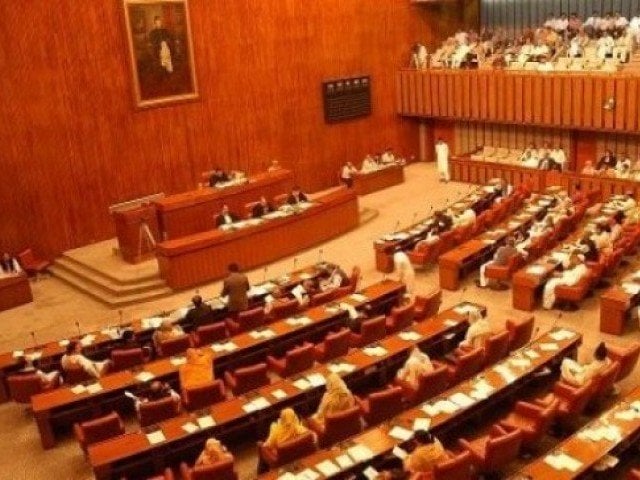
The Senate Standing Committee on Finance and Revenue recommended that the imprisonment period and penalties for concealment of assets, abetting to conceal assets and for non-compliance with tax notices should be reduced.
The Senate standing committee on Tuesday continued clause-wise discussion of the Finance Bill 2019 under the chairmanship of Senator Farooq H Naek of the Pakistan Peoples Party (PPP). On the recommendation of OECD and the United Kingdom’s tax authorities, the Pakistan Tehreek-e-Insaf (PTI) government proposed in the budget imprisonment of seven years and imposition of a fine equal to 200% of evaded taxes on concealment of offshore assets.
HCSTSI seeks time to declare assets
The government has also proposed imprisonment of two years and imposition of a fine equal to 2% of offshore assets for not responding to a tax notice served on a person who holds offshore assets.
Instead, the standing committee recommended that the period of imprisonment should not be more than three years on concealment of assets and the fine should be only Rs500,000. It proposed one-year imprisonment for not responding to the tax notices served by the Federal Board of Revenue (FBR).
The government has proposed these punishments on recommendations of the HM Revenue and Customs (HMRC) and OECD, and the Senate committee’s objections would help it to persuade foreign jurisdictions to reduce the punishment, said Dr Hamid Atiq Sarwar, member Inland Revenue Policy of the FBR.
Pakistan has entered into an agreement with the OECD to curb tax evasion. So far, it has received information about 152,000 bank accounts, but no significant tax has been recovered. The government has also filed a reference against a sitting judge of the Supreme Court of Pakistan on concealment of offshore assets.
The standing committee endorsed the proposal of publishing the tax directory of offshore asset holders. Sarwar said half of the information received from the OECD could be disclosed, while the rest could not be shared with public.
The committee rejected the government’s proposal of allowing income tax commissioners to conduct raid on premises of people on the basis of reliable information of undeclared gold, bearer securities of foreign currency and confiscate these undisclosed assets.
The committee chairman said these powers must not be given to the commissioners as these were prone to misuse.
The committee endorsed a proposal that allowed commissioners to seize domestic assets of a person who evaded offshore taxes and was about to leave Pakistan. Sarwar said that condition had been included on the requirement of the Financial Action Task Force (FATF).
The standing committee also endorsed the proposal of halving the limit to Rs5 million, which could be remitted to Pakistan from abroad without disclosing the source of income. Currently, the recipient of Rs10 million in annual remittances is not required to disclose the source.
PM’s tax amnesty scheme fails to attract people
FBR Chairman Shabbar Zaidi said the FBR was thinking of replicating an Indian law, which authorised investigation into the outward flow of remittances.
The chairman pointed out that the Protection of Economic Reforms Act of 1992 and Foreign Exchange Regulations Act of 1947 legalised the outward flow of dollars. Over the past 40 years, about $40 billion had been taken out of Pakistan, said Zaidi.
The standing committee approved the government’s proposal of making it binding for people to buy assets only through banking instruments, if they wanted to claim tax credit on these assets.
Zaidi said an outright ban on purchase of these assets including property on cash could not be imposed due to legal obstacles.
The Senate panel rejected the government’s proposal of denying people exemption from capital gains tax if they sold properties before 10 years. Currently, the tax-free gains are allowed if a person sells property after three years.
But in order to discourage speculative activities, the government has proposed to increase the holding period to 10 years. The committee proposed to limit the period to five years.
The standing committee endorsed the government’s budget proposal that disallowed tax credit on expenses incurred on payment of commission to dealers of various commodities. The government has taken the measure to stop tax evasion by major sectors of the economy including the sugar sector.
The FBR chairman said he had offered sugar dealers to get registered with the FBR and in return the government would reduce the minimum income tax from 1.5% to 0.25% for them. He pointed out that sugar millers sold 40% of their produce through dealers but did not show their income in tax returns.
Published in The Express Tribune, June 19th, 2019.
Like Business on Facebook, follow @TribuneBiz on Twitter to stay informed and join in the conversation.

1732184775-0/BeFunky-collage-(80)1732184775-0-165x106.webp)

1731933289-0/BeFunky-collage-(68)1731933289-0-165x106.webp)













COMMENTS
Comments are moderated and generally will be posted if they are on-topic and not abusive.
For more information, please see our Comments FAQ